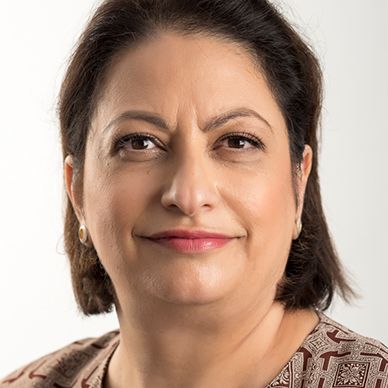
Zarin Patel
NED at Anglian Water Service and Post Office Ltd; Trustee at National Trust; Independent Member of Audit & Risk Committees at John Lewis Partnership and HMRC.
You can listen to Zarin’s story in full exclusively in our Resource Centre:
Succeeding as a portfolio NED
Zarin Patel has just added her first listed board role, with Pets at Home, to a portfolio already full of household names. “I will be a little controversial here,” she says, “for some, a plc role matters more than other boards. I fundamentally disagree with that. All the boards I’m on – in different sectors – are well run and fulfilling to be involved with.”
The ‘national treasure’ status of the brands she now guides as a non-executive is familiar to Zarin, who spent much of her executive career at the BBC. An accountant by training, she left the BBC as their CFO and had previously been CEO of their revenue generating division.
Defining your value-add
Zarin’s strong executive career, which she combined with board roles at University of Arts London and the BBC, positioned her well for a non-executive career. When it comes to how this experience translates to the boardroom Zarin explains, “My expertise is really in digital transformation in complex organisations. For example, at the BBC we launched iPlayer before other streaming services had become established. My knowledge is not so much about the tech itself, but about how that tech is used. That is what really drives change. This has been very useful at John Lewis recently, as Covid-19 has accelerated the move to online commerce.”
Zarin’s seemingly easy articulation of her value-add as a non-executive belies the focused attention required to get to this point.
“I’ve honed it now, and it trips off the tongue,” she says, “but it’s something I worked on at the start of my journey. I had a huge amount of help from Women on Boards, particularly the Board CV Masterclass and talking to other members about their journeys.”
Zarin now coaches professionals looking to transition to a portfolio career, and often begins with the same advice. “My advice to those looking to build a NED portfolio is to get your brand proposition right. What is the thing you can bring to the board?” she asks. “You can finesse it to each organization, but it needs to be persuasive, short and understandable.”
‘Auditioning’ for NED roles
Zarin began by building strong relationships with headhunters, which means she is now in a position where she is highly selective about which roles she goes for.
“At the start, it’s a bit like being an actor or singer, you need to go to the auditions. Being rejected can be heartbreaking, but you have to do it.”
Zarin also points out that going forward for roles helped to build relationships with the headhunters, and board Chairs. “I have a few trusted headhunters now, who know what roles will suit me and I trust their judgement,” she says. “I actually said no twice to being put forward for the National Trust. But the headhunter was right – they are an organisation serious about climate change, modernizing how we look at the past and fast developing a strong digital presence. I’m very pleased to be on their board.”
Zarin recognises she may have been ‘the token diversity’ on some long lists. “I don’t mind when they are serious about creating space for a different voice and are upfront about lacking diversity,” she considers. “But it is hugely frustrating when you realise you were just there to make up the numbers and there was always a preferred candidate.”
It is often said that a non-executive recruitment is very much a two-way process. “It’s almost like dating,” she laughs, “everything can be right on paper, but if there’s no rapport there, it’s not going to work.”
“Remember that the organization will be showing you its best side,” she points out. “I always ask questions to try to get under that. For example, I normally ask them to tell me about a time when there was disagreement on the board and how that was managed.”
The practicalities of a portfolio
Finding and balancing the roles you hold in your portfolio is a challenge for all portfolio NEDs. “My portfolio is very well balanced now, and it looks like it was designed like that. The reality is that it felt more like luck in getting to this point,” Zarin explains.
When asked about the financial side of being a portfolio NED, Zarin cautions you need to consider the mix of roles. As a charity, the National Trust is unpaid but Zarin explains, “I do it for the love. And I gain exposure to complex issues there, which helps me develop as a NED.” For the remunerated positions, Zarin considers the rate can be a reflection of the value they ascribe to governance. She says, “If they are paying at a higher rate for their sector, it’s a good sign they take it seriously.”
Prioritising your own professional development is also important. “I now set aside structured time to keep up with developments in relevant areas, like cyber, ESG and current shifts in consumer behaviour,” Zarin explains. “You don’t need to know it all as a NED but you need to know enough to ask the questions.”
Finally, Zarin feels there is a big difference in professional life as a portfolio compared to a full time job. “Be sure you really want to be a portfolio NED,” she says, “it is a lot more solitary. However, it is incredibly flexible and stimulating. I am very much enjoying portfolio life.”
